Letters of Job Termination
-
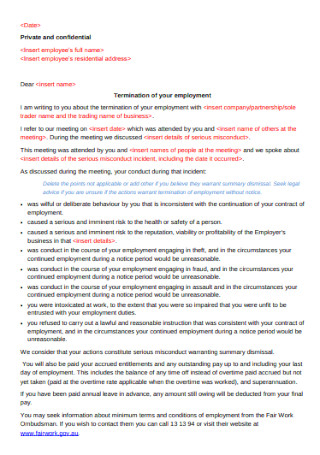
Termination of your Employment Letter Template
download now -
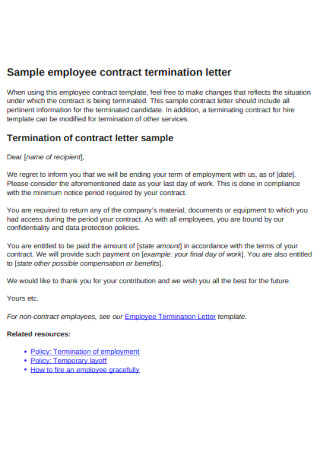
Sample Employee Contract Termination Letter
download now -
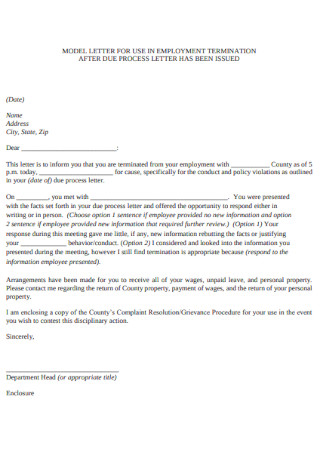
Employment Termination Model Letter
download now -
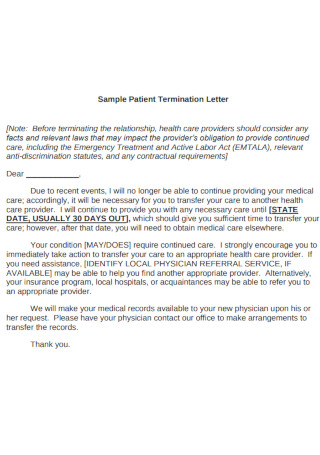
Sample Patient Job Termination Letter
download now -
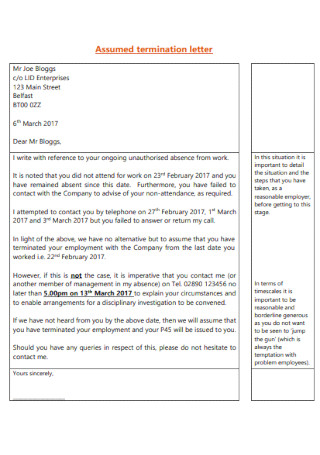
work Termination Letter
download now -
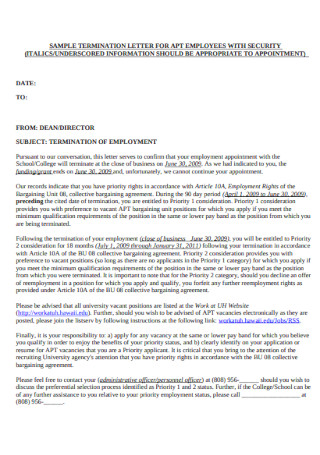
Sample Security Employee Termination Letter
download now -
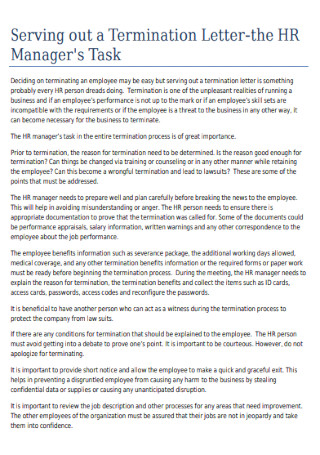
Manager Termination Letter
download now -
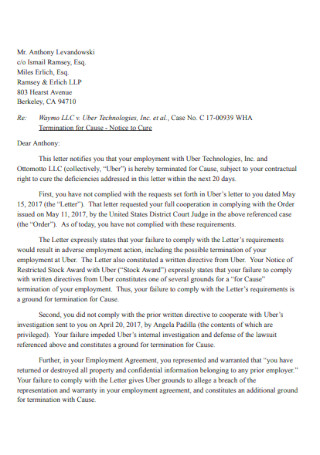
Sample Employment Termination Letter
download now -
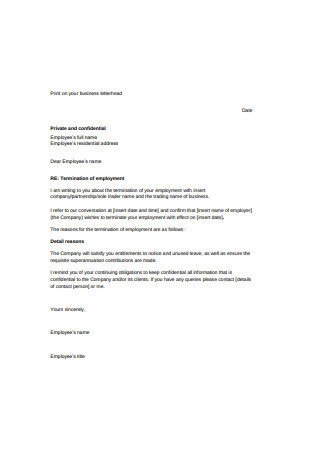
professinal Employee Termination Letter
download now -
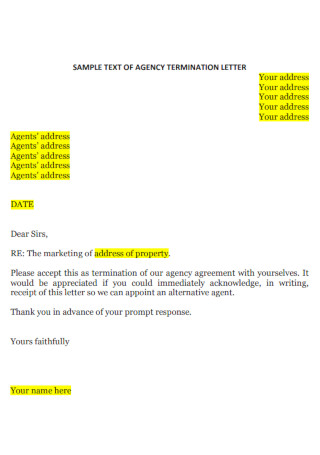
Agency job Termination Letter
download now -
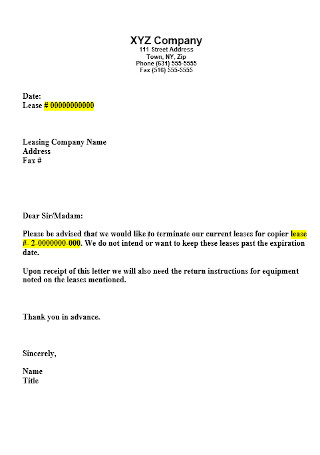
Company Lease Termination Letter
download now -

Sample Client Termination Letter
download now -
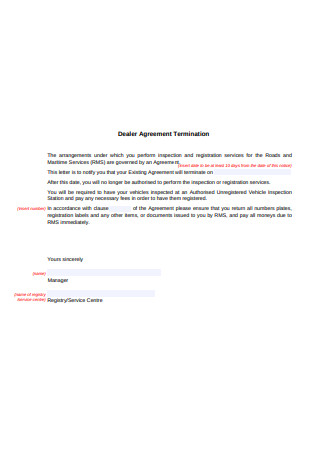
Dealer Agreement Termination Letter
download now -
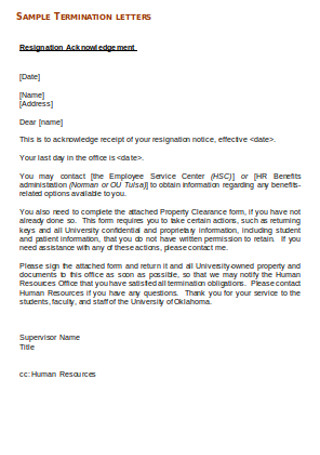
HR Termination Cover Letter
download now -
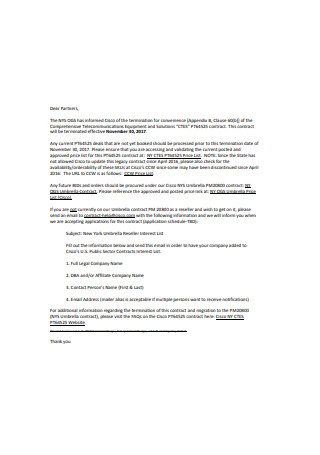
Partners Termination Letter
download now -
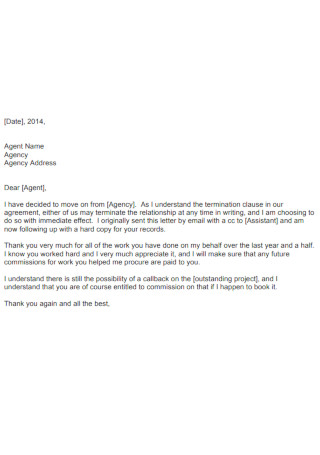
Sample Agent Termination Letter
download now
FREE Letter of Job Termination s to Download
Letters of Job Termination
What is a Letter of Job Termination?
Types of Job Termination
Common Causes for Employment Termination
How To Write a Letter of Job Termination
FAQs
How do you inform your employee about his or her termination?
Can I fire someone without proper warning?
What can you do if you were wrongfully terminated?
Is retirement possible after being terminated?
How do you respond to a termination letter?
What is a Letter of Job Termination?
A letter of job termination is a legal document that formally informs your employees of their termination from your company. Usually, this is given a few days before your employee gets fired, explaining your company’s reasons for terminating their services. Some of your reasons may include their incompetence to perform well at work, their failure to hit quotas, or their continuous tardiness. Furthermore, when your company requires to lay off a few employees to keep up with your operational costs and finances, you also use a letter of job termination to your employees.
Types of Job Termination
As the employer, you have all the right to terminate your employees for the benefit of your company. Job termination occurs in various situations, and this includes you terminating your employees due to layoffs, your employee’s misconduct, their breach of contract, or when they decide to quit your company.
Common Causes for Employment Termination
There’s a lot of reasons why you need to terminate your employees not just because your company is in a tight situation and some of these are the following:
Violation of Company Policy and Code of Conduct
It is inevitable for employees to commit mistakes at work. However, when these mistakes are repeated continuously upon multiple warnings, this is no longer a coincidence but an intentional violation of your company policy. Always late or absent for work, incompetence to follow instructions, poor productivity, and horrible work ethics, are some examples of your employee’s violation on your company policy and code of conduct, which are excellent reasons for employee termination.
Breach of Contract
During a breach of contract, as the employer, you have the right to terminate your employee and to enforce your terms of contract breach. This may include requiring your employee compensation for the damages made. However, if your employee fails to comply with your terms, you may settle the issue at court by filing a lawsuit against your employee.
Threats, Harassments, and Extreme Violent Behaviors
Threats, harassments, and extreme violent behaviors may occur within the office, and you may not even know about it until one of your employees files a complaint to your HR management. Once this happens, your administration should begin their investigation until you get into the bottom of the issue. Depending on the level of offense your employee committed, you apply the necessary penalty. For a worst-case scenario, your employee can even be terminated from work.
Theft on Company Assets
Theft of your company assets, such as information, resources, and cash, is one of the greatest offenses your employee can commit. Do not let your employees take advantage of your company’s assets and investigate as soon as you detect any employee theft. Make sure to contact an intellectual property attorney to help you with the case if necessary. Once your employees are proven guilty of theft, you have all the right to dismiss them and file a lawsuit against them.
Lying and Falsifying of Records
Fraud is another primary offense your employees may commit during their employment. Some of these common cases of fraud and falsifying of records include unrecorded vacation and sick leaves, made-up inventory list, fictitious travel vouchers, purchase orders, and petty cash, which usually leads to theft. And most probably, throughout your management, you have encountered employees who have these types of intent in your company. Gather sufficient evidence against their actions and present them along with your notice of termination as you settle your case with them with the aid of your company attorney.
Extreme and Constant Insubordination
There are various reasons why insubordination occurs between you and your employees, and some of the main reasons are stress, rebellion, and their thirst for power. Whether it’s job-related or personal, when your employees are stressed, there’s a higher risk of your employees declining a task or even to snap. On the other hand, some would rebel against your style of management if they think it violates their rights and would refuse to follow directions from your supervisors. When this occurs, do not automatically terminate all of them, for this is a significant loss to your company. Instead, assess the situation and meet with them halfway to change their attitude. However, when your employees desire power, they fail to accept any instructions from your administration. This type of employee should be terminated as soon as possible to avoid further complications.
Conviction of Crimes
Although there is no direct rule or law in dismissing your employee you are alleged for committing a crime, your company still suffers a negative effect on your employee’s recent actions, resulting in damage to your company’s image. You still need to consider that you need to stay on top of the competition, and what occurred to your employee may serve as a weakness your competitor might use against your company. Therefore, in accordance with your company policy, it is best if you will terminate your employee’s services.
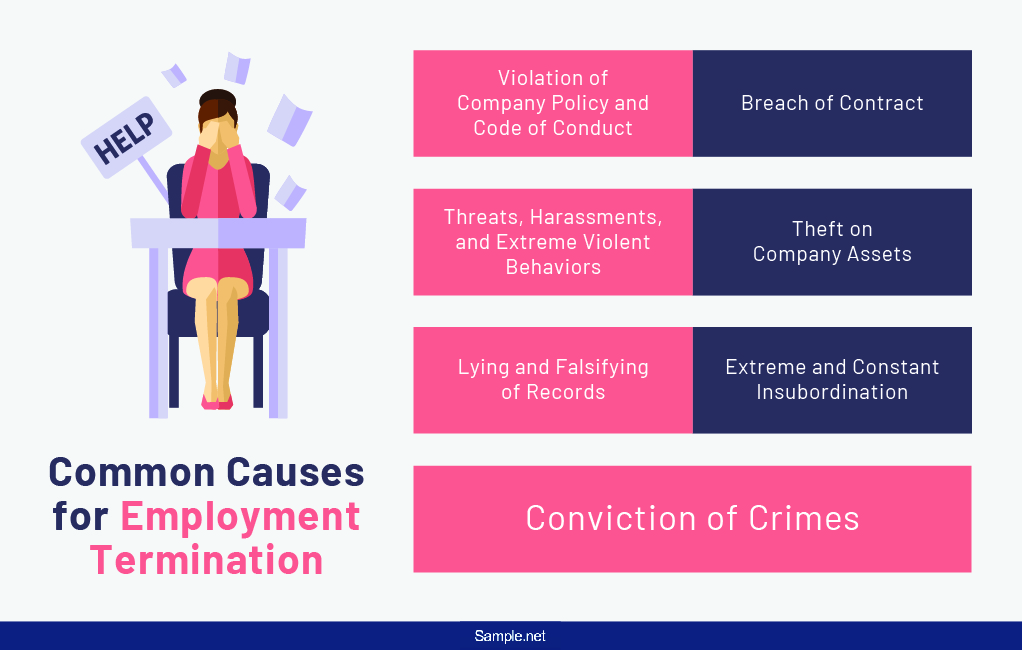
How To Write a Letter of Job Termination
Serious offenses are one of the primary reasons for employee termination, aside from unwanted layoffs and employee reduction. Once you have fully decided on who to lay off and how to respond to your employee’s recurring violations, then you can make a letter of their job termination to close the issue. If you need some assistance in making one, here are a few tips listed below:
Step 1: State the Name of the Employee for Termination
In writing your letter of job termination, start by stating the name and details of the people you wish to dismiss from your company. Indicate their employee ID number, their position, department, and their immediate supervisor. Then, add the date of their termination as proof for legal purposes.
Step 2: List Down Your Reasons for Termination
There are various reasons why you terminate your employees. Whether it’s a voluntary or involuntary termination, address your reason for their dismissal. Make sure that every asset or company property used by your employee is returned in good condition as a requirement for their employment clearance. Then, indicate the receipt of your company’s property in your letter of job termination.
Step 3: Use the Right Tone of Writing
Never forget to use the right tone of writing. Make sure to use a formal and business tone that keeps everything professional and factual to your employees. As much as possible, avoid using phrases such as “look on the bright side,” “now you can spend more time with your sick child,” or “a less stressful job is better for your poor heart condition anyway” since these phrases are unprofessional and discriminatory, which may hurt the feelings of your employees.
Step 4: Include the Employee’sEmployee’s Severance, Benefits, and Compensation
Upon terminating your employee, depending on the reason for their termination, provide them with adequate employee severance pay, benefits, and other dismissal compensation. This may include the details of their final paycheck as well as your other legal agreement. Then, indicate all this information inside your letter and add clear instructions on how your employee may avail of your compensation.
FAQs
How do you inform your employee about his or her termination?
Once you made your final decision to terminate or layoff your employees, for whatever reason it may be, it is advisable to send them a notice of termination ahead of time even though the law does not obligate you. As much as possible, let them understand your reasons for termination and set a proper termination meeting with them. In doing so, you reduce the risk of your ex-employees from badmouthing your company.
Can I fire someone without proper warning?
The federal law doesn’t need you to give your employees a reason for their dismissal, and technically, firing your employee without a proper warning is not illegal. However, depending on your state’s response to the laws and policies of employee termination, your company still needs to abide by the law to avoid lawsuits in the future. After all, your state still protects employees who are wrongfully terminated.
What can you do if you were wrongfully terminated?
When your employer wrongfully terminated your employment, it is best to stay calm and think of all the reasons why you were terminated, then request for a reason from your employer for your dismissal. Never forget to seek assistance from employment lawyers as they are much knowledgeable about this type of situation. See to it that you were compensated adequately before signing any papers. If you think that you are wrongfully terminated or discriminated against, remember that you can fight for your rights as an employee.
Is retirement possible after being terminated?
Employees who were terminated due to their breach of contract, misconduct, poor performance, and, most of all, abandonment of their job are not eligible for rehiring. However, depending on your employee’s reason and your management’s decision, there is still a slight chance for them to be rehired. Some of these reasons may include the court’s decision to oblige your company to rehire the employee or perhaps the employee’s proof of ethical conduct and performance during their past employment period.
How do you respond to a termination letter?
If your company decides to terminate you and is hell-bent on having you sign their termination letter without giving you many details, there is a great possibility that there is something wrong with the situation. As much as possible, let an expert in the employment law review your severance package before you sign any papers to avoid complications in the future.
Terminating your employees is never a pleasant experience. Aside from losing an asset, your terminated employees lose their source of income. Nevertheless, for your company’s sake, you need to make sacrifices without failing to abide by the laws and to compensate your employees for their job loss. Never forget to document your employee termination and keep a copy of your letter of job termination as your future reference for your company’s management plan and SWOT analysis.
